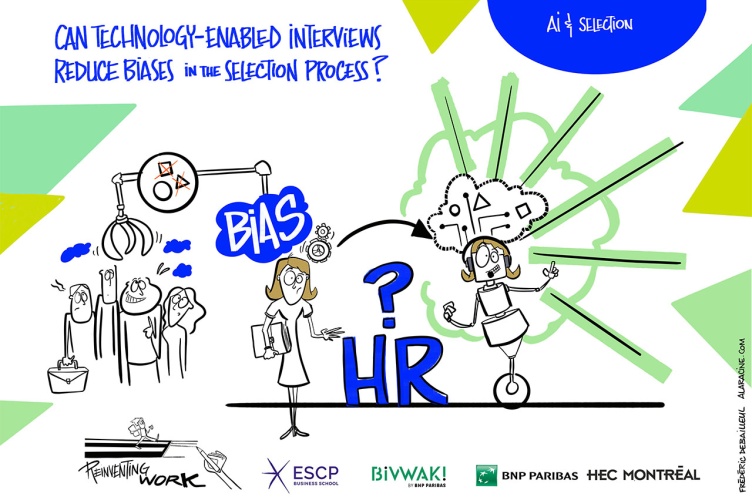Technology-enabled interviews A fascinating project launched in Spring 2020
Research context
Launched in the Spring of 2020, this study initially sought to test whether technology-enabled interviews helped reduce selection bias. The goal was to compare selection decisions before and after the implementation of these technologies.
However, as we were unable to find companies that had actually implemented such interviews, we were forced to modify the initial research design.
We, therefore, documented the potential advantages and disadvantages of technology-enabled selection tools, such as chatbots, fit algorithms, synchronous and asynchronous videos, and digital interviewing.
Research question
What are the potential advantages and disadvantages of digital technology and artificial intelligence in staffing?
Methodology and milestones
The data collection was twofold :
After writing a literature review, we conducted interviews with two HR professionals using one of these technologies to document their experience.
We then administered an online survey to 175 candidates, in France and in Canada, in order to gather their impressions on the use of these technologies in a selection context.
Research team
- Anne Bourhis (HEC, Montréal)
- Amandine Desvergnes (HEC, Montréal)
- Emmanuelle Léon (ESCP, Paris campus)
- Marjorie Bonnet (ESCP, Paris campus)
Research keytake aways
From the HR professionals' point of view: those who use a fit algorithm report satisfaction with its ability to improve the selection process, hiring diversity and candidate experience.
From the candidates point of view: more than half of candidates have never experienced technology-enabled selection tools yet. Candidates who have this experience rated it as satisfactory, but the large majority (73 %) would rather be recruited entirely by a human being. Among the different tools presented (chatbot, fit algorithm, synchronous video interview, asynchronous video interview, digital interview), the one that arouses the least suspicion is the synchronous interview.
The effect of these technological tools on improving both candidate experience and diversity remains to be demonstrated.
Another study (developed by Marjorie Bonnet in 2021) has highlighted additional results, soon to be communicated.
Attention points: The use of these tools for staffing purposes is still in its infancy, and the rapid adoption of online technologies as a result of the COVID pandemic may quickly change these preliminary results.
12 Research projects from the Reinventing Work Chair
By bringing together academics and professionals, the Chair facilitates renewed theoretical and practical views of the following key topics:
- Reshaping the work experience
- The role of agility to organise and change work
- Measuring the paradox of flexible working
- Psychological contract and new work relationships
- HR & digitalisation
- Talent sharing as a new development tool
- Technology-enabled interviews
- Shifts in expertise in the data science era
- Managing in geographically dispersed virtual organisations
- Virtual teams and well-being
- Meaning of work and self-organisation
- New contact centres & hybrid work (coming soon)
Key outcomes
External ecosystem
Shared research outputs / Awards and articles
"Le numérique et l’intelligence artificielle au service du recrutement et de la sélection du personnel", Amandine Desvergnes, Master thesis, HEC Montréal
“Intelligence artificielle et recrutement: l’IA permet-elle de réduire les biais discriminatoires à l’embauche”, Marjorie Bonnet, Master thesis, ESCP Business School
Campus
